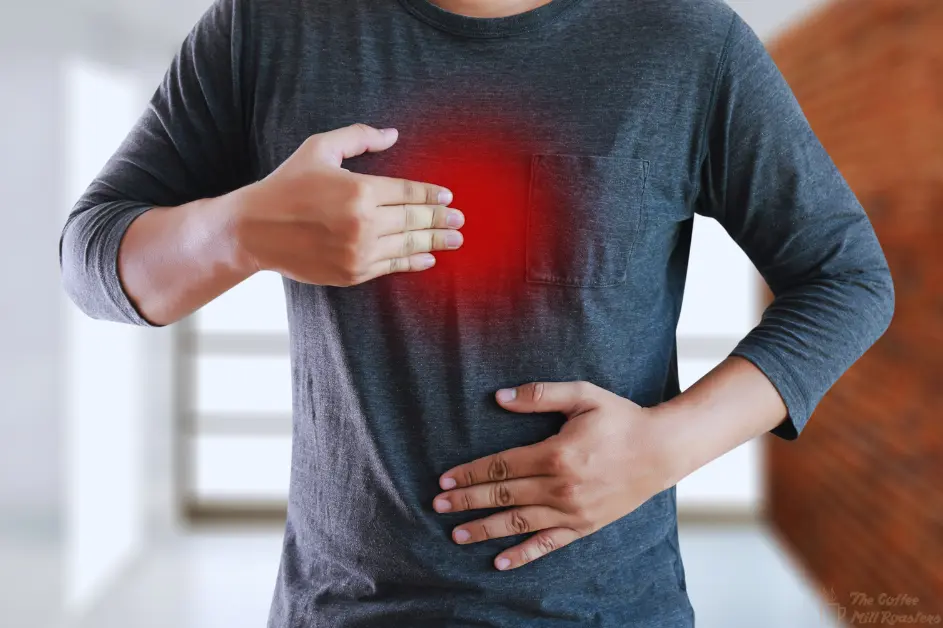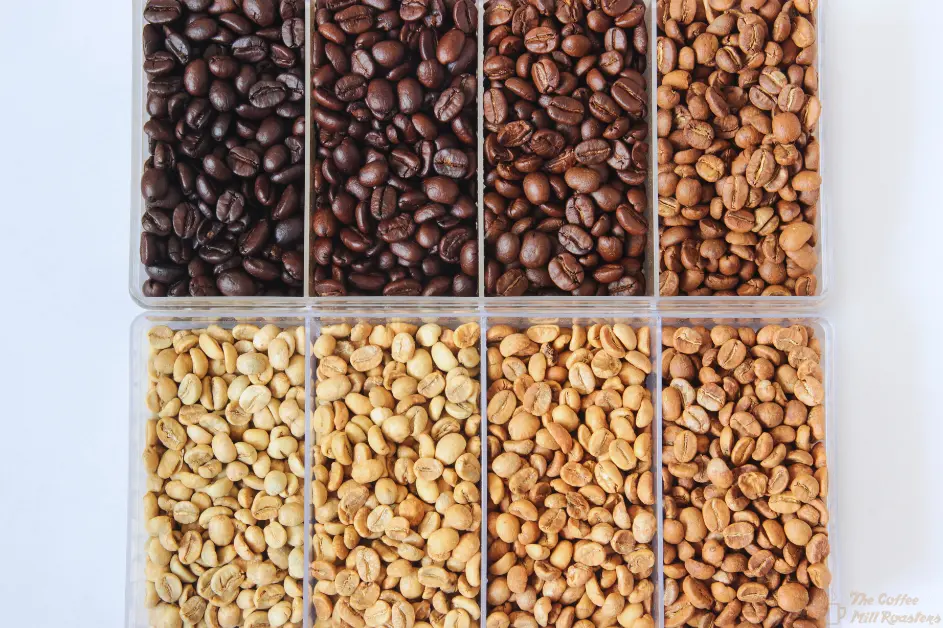The hydrochloric acid in our stomach helps with our digestion by breaking down consumed food. In general, it has no adverse effect on our bodies. But, its production in the stomach can be accelerated in the presence of caffeine. As a result, you may experience gastrological difficulties including heartburn, chest pain, and regurgitation.
Coffee drinkers often struggle with these issues, since coffee is full of caffeine. So, people with acid sickness decide to leave regular coffee due to its higher acidity. Most of them will pick decaf coffee as an alternative. But, is decaf coffee acidic?
Decaf coffee has the lowest acidity because it undergoes the decaffeination process. The process reduces most caffeine, which is liable for acidic sickness.
In this post, we will discuss whether decaf coffee will help prevent acidic illness. Let’s learn in detail.
- What is Acidity in Coffee?
- Is Decaf coffee acidic?
- What type of coffee is least acidic?
- Which Decaf coffee has the least acid?
- Does decaf coffee bother acid reflux?
- How do you make coffee less acidic?
- Does decaf coffee make you gassy?
- Will decaf coffee keep me awake?
- What are the negative effects of decaf coffee?
- Caffeinated vs. Decaffeinated – Which one is better?
- Final thought
What is Acidity in Coffee?

The term “acidity” indicates the taste and aroma of coffee beans. It is an important uniqueness of coffee beans that helps us understand the range of flavors. But, it doesn’t dictate whether coffee is good or bad.
Acidity in coffee is a simple measurement of pH level in beans. The flavor and taste of coffee mostly depend on the variation of pH levels. However, acidity in coffee can be changed during the roasting process.
Every food in the world contains a certain amount and type of acids. Similarly, you will find a wide range of acids in coffee. They are not bad at all. Rather, acids in coffee point out the flavor of specific beans. For example, coffee beans containing Phosphoric acid will taste sweeter than other beans.
We commonly find a variety of acids in coffee beans, including citric acid, malic acid, phosphoric acid, chlorogenic acid, acetic acid, quinic acid, and tartaric acid.
Is Decaf coffee acidic?

It is nearly impossible to find a coffee ground without acidic features. Decaf coffee is acidic too. But, it carries very low acidity compared to regular coffee. So, it can be a good drink for people who want to lower heartburn (a symptom of acid reflux) after drinking coffee.
Decaf coffee goes through Water Decaffeination Process. It is a step where the acidic features of coffee beans are taken down. Hence, decaf coffee has very little acidity.
Any food with a pH level below 7 is marked as acidic. For example, the pH level of regular coffee remains between 4 and 5. But, the pH level of most decaf coffees is nearly 7.
The pH level proves that decaf coffee is not entirely alkaline. But, it losses a huge amount of acidity during the decaffeination process.
What type of coffee is least acidic?

At present, it is possible to change the acid level of beans during the roasting process. But, how do you find the least acidic coffee ground as a consumer? Well, there is no need to be a coffee roast expert. You can understand the acidic feature of coffee by simply checking the roast type.
Light Roast
The light roast is brighter than other grounds. It has a floral and sweet aroma. But, a light roast is the most acidic of all coffee. So, you should avoid it if you are suffering from gastrological difficulties.
Medium Roast
Medium roast is well balanced in flavor and sweetness. For this reason, it is the most popular roast in the world. Due to its moderate acidity, people with sensitive stomachs prefer medium roast.
Dark Roast
Dark roast has the lowest acidity among all coffee roasts. It has a more aromatic and chocolaty flavor. But, coffee beans lose their real flavor due to the specific roasting process. Many people like dark roast because of its bold and bitter taste.
NOTE: If you want to buy the best decaf coffee to prevent acidic sickness, always choose the dark roast. Unfortunately, many coffee companies don’t produce dark roast decaf. In that case, you can pick medium roast decaf too.
Which Decaf coffee has the least acid?
Nowadays, a large number of people experience acidic stomach issues after drinking coffee. Besides, they have been aware of the danger of too much caffeine. So, many of them are switching to decaf to reduce caffeine consumption.
It is crucial to discover a good brand for decaf coffee that maintains standard decaffeination and roasting process.
Does decaf coffee bother acid reflux?
Caffeine is one of the familiar reasons that cause acid reflux. Regular coffee is full of excessive caffeine content that increases acid production in our stomach. So, drinking fully caffeinated coffee can cause heartburn and acid reflux immediately.
On the other hand, it is reported that regular decaf coffee drinkers experience less or no acid reflux. Decaf coffee comes with a small amount of caffeine, which is tolerable for most coffee drinkers.
The decaffeination process reduces more than 97% of the caffeine from coffee beans. Therefore, it is safer to drink and doesn’t bother acid reflux in general. So, if you are a sufferer of acid reflux, you can drink dark or medium roast decaf coffee. People with acidity should always avoid light roast due to the highest amount of caffeine.
How do you make coffee less acidic?
Low acidic coffee is now widely available in retail shops. You have to do nothing to lessen the acidity from the ground. But, what to do if you have a regular option only? You can apply many techniques to enjoy less acidic coffee anywhere. Let’s explore the following.
Cold Brewing
Cold brewing is a popular variant of coffee around the world. It is well-balanced and tastes less bitter than traditional coffee. People who have gastrological issues enjoy cold brewing because it is less acidic.
You can make it with almost any ground coffee. But, dark roast is the ideal ingredient to make cold brew coffee. To make a cold brew, you have to immerse the coffee ground at room temperature water for at least 16 hours.
Finally, you have to filter the coffee before drinking it. Cold-brew coffee loses about 70% of acidity during soaking and filtration.
Buy Dark Roast
The easiest way to identify acidity in coffee is to understand the type of roast. The lighter roast is highly acidic. In contrast, the dark roast has very low acidity. Dark roast is processed under many chemical reactions.
Thus, it loses most of its acidity. Moreover, it tastes and smells very nice. If you have any stomach issues like acid reflux, you should be habituated to buy and drink dark roast.
Reduce the Temperature
The oil in the coffee beans is the primary source of acids. Coffee beans release those acids when they are boiled. If the water temperature is very hot, it will extract more oils. So, the coffee beans will release more acid. To avoid over-extraction and acidity, you can simply reduce the brewing temperature.
Shortening the Brew Time
This method is similar to the previous one. Brewing coffee beans in hot water for longer can increase acidity. The perfect hot brewing time is about 2 to 4 minutes. If you want to avoid acidic coffee, you should not brew beans for more than this duration.
Drink Immediately
You should drink hot brewed coffee as soon as possible. The coffee ground keeps releasing oils even after pouring them into a drinking cup. It can maximize the acidity if kept for a long time. So, drinking your coffee right after brewing is a good practice to stay away from maximum acidity.
Add Milk
Milk is a nutritious liquid for the human body. It is often mixed with coffee to make it tasty and creamy. However, milk can also reduce the acidic content of coffee. The calcium in milk helps balance the pH level of coffee. You can have the maximum result by mixing milk with dark roast. But, this technique may not be effective in the case of light or medium roast.
Add Salt
Salt is an acid neutralizer itself. Some people add salt to coffee to reduce the bitterness. In reality, salt reduces the acidity in coffee that tastes good afterward. It is a useful ingredient for people with an acidic stomach to avoid acid reflux. This is one of the easiest and cheapest ways to make your coffee less acidic. However, you have to be careful about the quantity.
Does decaf coffee make you gassy?
If your stomach is sensitive to caffeine, any kind of coffee, including decaf, can make you gassy. The acidic content in coffee drives our digestive system faster than usual.
It leads to more hydrochloric acid production that causes malfunctioning in our stomach. As a result, we feel bloating and discomfort inside the stomach. Drinking coffee on an empty stomach can worsen the situation.
Replacing your regular coffee with decaf can assist in preventing a gassy stomach. But, it will not solve the problem permanently because decaf coffee still contains a small amount of caffeine.
You can start consuming low-acid coffees or completely be habituated to cold brew. But, the best solution for a gassy stomach is to reduce coffee consumption.
Will decaf coffee keep me awake?
Caffeine makes our brain cells alert and helps us to stay awake. If you drink coffee with no or low caffeine, there is no reason that coffee will keep you wakeful.
During the Water Decaf Process, coffee beans lose a high level of caffeine in them. As a result, decaf coffee finally comes with incredibly low caffeine. Most coffee brands manufacture decaf coffees that are at least 97% caffeine-free.
So, if you drink coffee to stay awake for a few hours, decaf will not help at all. However, decaf is excellent for those who are suffering from insomnia.
What are the negative effects of decaf coffee?
Because of the low caffeine, decaf is a good choice against acidity. But, it can have some drawbacks too.
Headache and Drowsiness
Billions of people in the world drink coffee to get rid of drowsiness. It is because the caffeine in coffee helps boost our brains. But, decaf has almost no caffeine and it doesn’t work effectively against drowsiness.
Moreover, a chemical compound called methylene chloride is used in the decaffeination process, leading to headaches, drowsiness, and nausea.
Raises Cholesterol Level
Most decafs are made of Robusta beans that carry a particular type of fat. If you consume decaf for a long time, your LDL level (bad cholesterol) can raise. As a result, you may have a risk of heart disease and stroke. If you want to eliminate the risk of cholesterol from decaf, choose Arabica decaf instead.
Lack of Caffeine
Caffeine has plenty of health benefits if consumed moderately. It improves our brain function, boosts metabolism, and accelerates fat-burning.
Additionally, antioxidants and caffeine in coffee positively impact athletic performance and prevent heart diseases. In the case of decaf, the caffeine content is removed from the beans applying the decaffeination process. So, regularly drinking decaf deprives you of many health benefits.
Interrupts with Bone Density
Calcium is an essential nutrient for our heart health, bone density, and nervous system. It is a natural cure to prevent fatal diseases like osteoporosis. However, obsessive decaf can cause calcium imbalance in our bodies.
Drinking decaf for a long while can grow metabolic acidosis. It is connected to a negative calcium balance that is hazardous for healthy bone density.
Caffeinated vs. Decaffeinated – Which one is better?
Which coffee is better to avoid acidity? It is a frequently asked question. Before we answer it, check out the comparison table to understand the basic differences between caffeinated and decaffeinated coffee at a glance.
| Differences | Decaffeinated | Caffeinated |
|---|---|---|
| Making Process | Undergoes a water decaffeination process, but the rest are the same. | Roasting and grinding. |
| Caffeine level | About 7mg to 10mg per serving. | About 70 to 140 mg per serving. |
| Acidity | Less acidic. | Highly acidic. |
| Taste | Milder in taste and less rich in flavor. | Very rich in taste, it also depends on brewing. |
| Brewing Method | Same as regular coffee. | It has dozens of brewing varieties. |
| Antioxidants | 15% to 20% less than regular coffee. | Rich in essential antioxidants. |
| Consumption Limit | No recommended limit. | 3 to 5 cups per day. (less than 400mg of caffeine) |
| Side Effects | Headache, drowsiness, high cholesterol, and calcium deficiency. | Acid reflux, insomnia, anxiety, restlessness, and dependency. |
Which is Better?
Regular coffee provides several physical and mental health benefits. It is rich in antioxidants and caffeine that act as a preventative against cancers, and type-2 diabetes. If you have no gastrological issues, you can drink caffeinated coffee for sure.
However, caffeine is harmful to people with gastrological diseases, insomnia, anxiety, stress, and acid reflux. Since decaf is less acidic, it is an excellent drink to cut your caffeine consumption. If you have a sensitive stomach, you should go for decaf.
Final thought
Now you have a comprehensive idea about decaf coffee. So, is decaf coffee acidic? Yes, it is. But decaf has the lowest acidity among all coffee grounds. It loses a high amount of acidic and caffeine ingredients during the decaffeination process.
Decaf coffees are available in the market. However, if you want the best result, we recommend buying dark roast decaf. You can pick one of our above-listed items.
Along with buying decaf ground, there are many techniques to make your coffee less acidic, for example, cold brewing. In general, decaf will not taste rich and keep you awake like caffeinated coffee. However, it is a good option to prevent your acidic sickness.